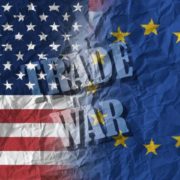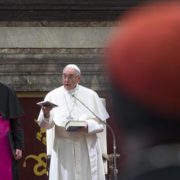The Holy See decided to step with great determination into the nuclear arms race occurring in East Asia around the threat of North Korea, with a massive international conference held in Rome over the past weekend.
Pope Francis himself introduced the conference condemning nuclear weapons as outright useless to any idea of security.
«If we take into consideration the principal threats to peace and security with their many dimensions in this multipolar world of the twenty-first century as, for example, terrorism, asymmetrical conflicts, cyber-security, environmental problems, poverty, not a few doubts arise regarding the inadequacy of nuclear deterrence as an effective response to such challenges», the Pope said, accompanied by Secretary of State Cardinal Pietro Parolin to underscore the Vatican’s commitment to the cause.
Cardinal Peter Turkson, at the helm of the conference, went even further by condemning nuclear tests that contaminate air and water and thus should be considered crimes against humanity.
The conference hosted nine Nobel peace laureates, Catholics and non-Catholics, Arabs and Israelis, survivors of Hiroshima, advocates of absolute disarmament, and arms experts warning against the next generation of weapons that blur differences between nuclear and non-nuclear arsenals.
The context is not abstract and remote. The Holy See intervenes in this at a time when a new nuclear arms race is afoot in North Korea and in East Asia, where already four countries (Russia, China, India, and Pakistan) are declared nuclear powers. And as the first nuclear arms race, after World War II, brought about five decades of Cold War, so could this new race.
As evidence that this is happening, while representatives of 159 countries were praying for peace at the conference in Rome, three US aircraft carrier groups were approaching North Korea to try to contain Pyongyang’s threats.
The Holy See said it can’t intervene to mediate diplomatically between North Korea and the United States, but certainly over the two days in the grand Pope Paul VI Hall, it felt like China was the elephant in the room.
It was as if China was listening. In fact in the same hours, President Xi Jinping was taking steps for peace, after concentrating for too long on China’s internal affairs. Xi met with his South Korean counterpart Moon Jae-in and vowed to seek closer coordination with Japan on North Korean issues.
More to the point, for the first time the Chinese Academy of Social Sciences (CASS) held a conference on the Catholic martyrs of Zhengding, a town in Hebei province where Xi began his political career in the late 1980s. The Catholics were killed as they peacefully opposed the Japanese troops invading China in the 1930s.
The CASS conference is extremely important because the Communist Party is shedding its old prejudice against Christians, often treated as traitors of China. This is also a legacy of the attitude of the Boxer rebels (1900), who killed Chinese converts as some kind of foreign spies, and latest incarnation of the pseudo-Christian Taiping uprising (1850-1864).
In the same hours, on Friday, almost to underscore the event, Chinese authorities officially recognized a bishop previously appointed only by the Pope in Lanzhou, Gansu province.
Perhaps Chinese leaders, aware of the conference, wanted to signal their support for the efforts of the Holy See, or perhaps they were just following the Way, the Tao, that beckoned them to the right path. Perhaps, they also believe, as Pope Francis said, that everything is interconnected, even politics.






I very glad and happy that Vatican initiated so important conference, conference dedicated to so many important subjects of Peace and security around the world. With it, I want to concentrate the attention of readers that for to solve in true form a problems as: poverty, social encounters, hunger, social inequelity and other hard problems that bring to terrorism, criminality and wars – must to demolite and to crush the capitalist system, becouse in the frames of present political and economic system we’re will can’t to to resolve a social problems of humanity.